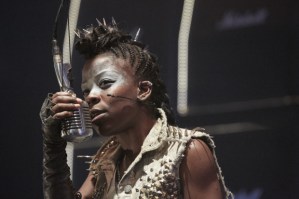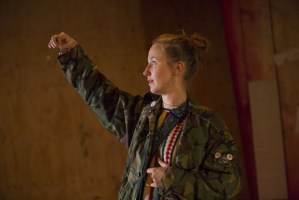Review: Laika (Unicorn Theatre)
Bryony Hannah and Avye Leventis reinterpret the historical tale of the first dog in space
In space, nobody can hear you howl. Laika was the world’s first astronaut – she just happened to be a dog. In 1957, at the start of the space race, Soviet scientists scooped a stray off the streets and sent her into orbit aboard Sputnik 2. Her mission came a mere month after the first ever satellite launch. Laika would boldly go where no living creature had been before.
It should be a simple story – not only a brilliant adventure with a perfect protagonist, but a story that proves that anything’s possible, no matter what your start in life. But Bryony Hannah and Avye Leventis’s version never lifts off. Rather than focusing on Laika’s tale, they put it in parallel with a human equivalent – a female astronaut Val, mother to Sami, about to head off on a mission to Mars. Both she and Laika are brave enough to broach new ground. Neither of them is lucky enough to return.
Anna Martine Freeman makes a fine female role model – a corrective to the endless images of spacemen – but her story’s unnecessary. Josie Daxter, who bounds around in a shaggy brown jumper, could have waved a banner for the pioneering woman in a more subtle way. As it is, the two stories double up – a melee of training montages and anti-gravity aerial routines – without either elevating the other. Laika ends up on the sidelines of her own story.
In the process, the messaging gets somewhat mixed. Told from a childs-eye perspective, Laika stresses the strength and determination of working mothers, but in pairing a dog destined to die in space with a mother heading to Mars, Hannah and Leventis end up with an abandonment narrative. It’s not entirely clear whether Val ever planned on returning – a huge thing to handle as lightly as this.
It doesn’t help that the show’s style’s a muddle – too many ingredients doing too many things. There are floating toys and portholes on the world, glow-in-the-dark constellations and light bulb stars. In one tangent, an usher chases Laika through the theatre; another overloads the young audience with an astronomy lecture. Rather than refining its story, Laika piles up moments and routines, ending up both distracted and altogether diffuse – a case of the tale wagging the dog.
Laika runs at the Unicorn until 12 November.















